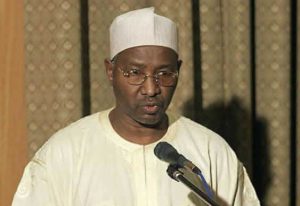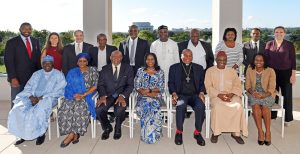There is no time to waste in creating change in Nigeria because the country is already on too dangerous a trajectory, peace and democracy activist, Dr Usman Bugaje has said.

Dr. Usman Bugaje
Dr. Bugaje was speaking at a United States Institute of Peace, (USIP) “Policy Roundtable on Media and Peacebuilding in Nigeria” Tuesday in Kaduna put together in furtherance of the mission of the Institute which is the possibility of a world without violence. The organisers wanted the participants to look again and more critically at how the media plays a role in violence and how that might be checkmated. Kaduna was an advisedly chosen site for what turned out a complicated, day long conversation among sundry intellectuals, media executives, peace practitioners, politicians and keen observers.
Dr Bugaje who arrived late from a different assignment just before Dr Chris Kwaja gave a vote of thanks said the level of poverty, the rapidly shrinking economy and the level of insecurity were such that waiting for 2023 for change is not the way out. Rather, he said “if we want change, we have to create change because we have no time”.
Arguing that journalists do have a responsibility to create change, the pharmacist turned politician and democracy campaigner said journalists could not close their eyes to bad governance or to leaders who occupy office for which they have no capacity or to leaders who came to office with no idea of it beyond self-aggrandisement. His definition of the change also includes journalists not closing their eyes if there is rigging. “If there is rigging, you have to report it”, he charged further.
Bugaje who hanged his change shopping list from journalists on the argument that there is something called ‘Journalism of Conscience also insisted “It is important we remind you”, saying he is aware of a group among journalists which started with the aim of stopping corruption within the media.
No positions were left uncanvassed by one presenter or the other at the Roundtable but almost none of such positions was spared of well aimed pot shots on the all consuming question of whether the media can help peacebuilding in Nigeria and how.
Although Political Scientist, Professor Jibrin Ibrahim spoke only during the second session, he still set the tone for the Roundtable. He referred to an article by Mallam Mamman Daura in the 1960s which reflected on the now late New Nigerian. It was about how the North was swamped by newspapers published from the Southern part of the country, creating the situation which compelled the Northern region to set up the New Nigerian Newspapers. It was the first newspaper with the compugrahic machine in the country and ran with a crop of intelligent journalists groomed in the mission of advancing the voice of the North.
But then something happened. The 1966 coup occurred and the mission of the New Nigerian speaking for the North had been changed to one of speaking for the whole nation by circumstances nobody contemplated. It meant that the defunct New Nigerian had just two weeks within which to unlearn the idea of speaking for the North and learn how to speak for Nigeria.
The logic of Professor Ibrahim, (more popularly known as Jibo)’s story is that it is the attitude journalists should all take. That is, to abandon what he calls deliberate use of information and images to cause havoc in the country. He recalled visiting Daily Trust sometimes back to wonder to the then Managing Director about pictures of herdsmen with brand new looking AK4, saying such were not images from anywhere in Nigeria but images being deliberately distributed. Those distributing it, he said, were not doing so because they did not know they are false images but with an agenda to cause havoc. “That is what is going on”, he maintained, charging journalists with taking exposure of mischief as collective responsibility.
The second plank of his presentation was on conflict in Southern Kaduna, a conflict he said he had followed since his first academic essay in the Review of African Political Economy, (ROAPE). He asserted how majority of Nigerians have come to the conclusion that there is genocide in Southern Kaduna “because 95% or more of the reporting of the violence reinforce that”.
The challenge, as far as he could see, is to interrogate how what he calls the one sidedness came about. His own analysis is that it is so because of what media scholars call indexing. Reporting generally and of conflicts especially is tied to the views of people in authority. In Southern Kaduna area, the people in authority would be the local government officers, head teachers and civil servants who become the key sources but all from one side of the conflict parties.
His second explanation is what he might as well have called the absence of the other side because the herdsmen who would have been that other side are a people with problematic relationship with the state everywhere in the world. So, they disappear and cannot tell their story, thereby reinforcing the imbalance in sides. He concluded by setting the task of those he would call the serious journalists to that of trying to interrogate own tendency.
Reinforcing his presentation in the first session earlier to address some of the points Professor Ibrahim had put on the table, Veritas University, Abuja academic, Adagbo Onoja intervened to caution against overstressing the autonomy of the journalist in conflict reporting. Representation, he said, is so problematic because the individual is inherently wired under the influence of Western binarism as for all reporting to be influence by good guy/bad guy imagination. That, he said, means that talking about objectivity is a waste of time because even if it were possible for journalists to be objective, the meaning of what journalists write does not lie with them but with the readers whom he said do so subjectively.
So, we are talking of genocide in Southern Kaduna now but tomorrow we will be talking about something different but still blaming the journalists, said Onoja. He did not dismiss the fact of subjective reporting but would want the emphasis to shift to the context in which deliberate circulation of false information and images or dubious narratives become possible. For him, it is the elite context that is most important in understanding subjective reporting or misinformation.
Putting current wave of mischievous information warfare in Nigeria in the context of elite fragmentation between President Buhari and the big names that supported his coming to power, Mr. Onoja said it is difficult for any journalists to get involved in counterbalancing the information warfare against the Buhari government because the government is so clumsy, unclear and incompetent. He said the circumstance is such that asking the media, civil society, the judiciary or security agencies to right wrongs is wrongheaded because they cannot do much when the elite are at war with each other. what he recommends is for peace practitioners to concentrate more efforts on enabling and enhancing the media literacy of conflict stakeholders “so that we can block the trigger capacity of headlines”.

A picture from a previous USIP function
Professor Ibrahim indirectly replied to this argument by stressing the technological context of media literacy in the world today and the extreme difficulty of that because the digital monopolies are using algorithms to undermine critical thinking. Facebook’s algorithms, for example, know the biases of every particular user and responds to the biases by feeding a particular user with stuff that reinforce the bias. The result is that the average user thinks he or she is thinking in tandem with the world itself and sees no need or bases for course changing.
Generally, the Roundtable called to explore how to configure media reporting of violence in favour of peace was a harvest of conflicting discourses as in the one between Mr Muyiwa Adekeye, Special Adviser on Media to Kaduna State governor, Nasir el-Rufai and the journalists. Mr. Adekeye who spoke at the opening session put on the ground the argument that an average reporter could make a contribution to holding a community together but moved on to say that the media in Kaduna State had elevated opinion over news. He is also convinced that the journalists covering the state have not made enough efforts to report from conflict spots. In other words, conflict reporting from Kaduna State is deficient in urban-rural balance.
Kaduna State, said Mister Adekeye, is a plural state, questioning how much journalists in the state had represented this pluralistic nature of the state even as he disclosed how the state government has trained 30 journalists, in spite of everything. That is in deference to his argument that, by being professional, a journalist could contribute to peacebuilding.
In response to Adekeye’s presentation was to come the charge volatility raised against the media adviser’s press statements. They are usually too volatile even for the most peace minded journalist, said one of Adekeye’s critics from among the journalists. It turned out that more than a journalist raised this while the adviser was still on the high table. But the bigger turbulence were still to come.
Theophilus Abbah, a former editor of Daily Trust on Sunday and the head of Media Trust Foundation presented a paper after Mallam Manir and Adekeye’s presentations. Abbah was at a debating advantage from his experience of being a former editor. He singled out for critical attention how profiling, stereotypes and similar naming practices implicate conflict reporting in escalation. It was well received except that a journalist pointed out how editors end up editing stories at the headquarters into conflict misreporting.
When Mr. Abbah had the opportunity to respond to this critique, he said that happens because many stories reporters send to their editors could not be published the way they were sent. “The figures (of death) do not add up most of the times. The argument does not make sense”, he said, adding how these compel editors to make additional telephone calls. By his argument, such editors end up getting different perspectives on such stories
He seemed to have responded to the issue but it came up again, leaving Manir Dan-Ali, Abbah’s former boss to respond this time. Manir said no editor could kill a good story and that when editors do additional legwork on received stories, it is always for the good of journalism.
On the whole, the day put together by the United States Institute of Peace, (USIP) squad in Nigeria was still a very productive day. Ambassador Zango Abdu, the Country Manager of USIP, said at the opening session that Nigeria is deep in crisis and over which there are divergent views. The Roundtable, he was sure, could contribute to producing a roadmap for peace and development.
Mallam Manir Dan-Ali, immediate past Managing Director of Media Trust who spoke for Daily Trust Foundation, USIP’s partners on the Roundtable, declared that journalists had a responsibility to refrain from doing anything that could endanger peace, adding that no one could do too much for peace.
Arguing that nothing else is possible without peace, the former media executive expressed worry that peace has become so elusive that “a whole governor cannot move freely in present day Nigeria”, an obvious reference to the repeated attack on governor of Borno State in Nigeria’s Northeast region in recent times.
He warned the media of the risk of becoming irrelevant that could come with taking sides, for example. Journalists and their media organisations could avoid taking sides by having two reporters of different identities in conflict spaces so that a particular media house could capture all sides to any conflict.
He argues that, in spite of the violence raging on the pages of newspapers and social media platforms, the reality on the ground is that Nigerians have not lost the Nigerian fellowship. Hence, his idea of the risk of degenerating into irrelevance if the media is not careful.
He expressed gratitude to MacArthur Foundation that he said had been sensitive to the ambition of Media Trust Foundation to expand philanthropic interventions in favour of those left behind by different benefits and privileges of modernity.
Part two of this report will wrap it up with how Hajiya Zainab Suleiman Okinno, a veteran columnist and Chairperson of the Editorial Board of Blueprint group of newspapers intervened. Hers is what would interest many professional journalists, particularly how she was accused of being an agent of Hausa-Fulani Oligarchy just because she was trying to enforce the principle of balance. She thus provided useful insights into the difficulties of being an editor today in Nigeria different from what the media theorists had to say. Hers will be taken along with what the journalists and the peace practitioners from the Institute of Peace and Conflict Resolution, (IPCR), Abuja, Plateau and Kaduna States were saying.




























